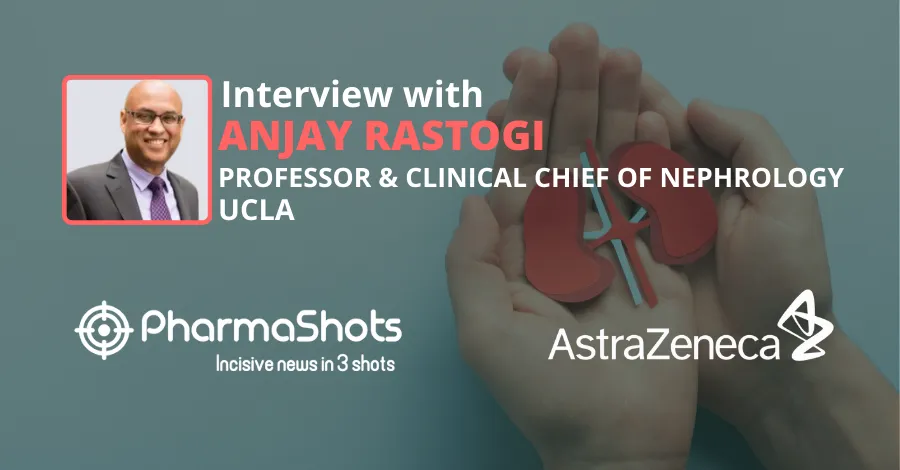
PharmaShots Interview: Biogen’s Toby Ferguson Shares Insights on the use of Spinraza for the Treatment of Spinal Muscular Atrophy
In an interview with PharmaShots, Toby Ferguson, Vice President & Head of the Neuromuscular Development Unit at Biogen shared his views on new data on Spinraza and improves clinical outcomes for the treatment of SMA patients
Shots:
- The first patient has been treated in the P-IIIb (ASCEND) study evaluating the higher dose of nusinersen in 135 children, teens & adults with SMA. The 1EPs of the study are the total change from baseline in RULM score & the study will integrate smartphone-based digital assessments as an exploratory EPs using Konectom NMD to self-assess motor function in daily lives
- The company shared baseline characteristics & initial safety results from the (RESPOND) study of Spinraza in 9 infants & toddlers which showed suboptimal clinical status in ≥2 areas after receiving Zolgensma
- The (NURTURE) study results continue to show the benefit of early treatment before SMA symptom onset & 92% of patients are able to walk alone
Tuba: Discuss the clinical data supporting the use of Spinraza in SMA.
Toby Ferguson: The SPINRAZA (nusinersen) clinical development program encompasses 10 clinical studies, which have included more than 300 individuals with spinal muscular atrophy (SMA) across a broad spectrum of patient populations, including two randomized controlled studies (ENDEAR and CHERISH). The ongoing SHINE and NURTURE open-label extension studies continue to evaluate the long-term impact of SPINRAZA.
SPINRAZA was first approved by the U.S. Food and Drug Administration in December 2016 and can be accessed in 65 countries. SPINRAZA has been evaluated in two Phase 3 studies in infantile and later-onset SMA (ENDEAR and CHERISH, respectively) and supported by open-label studies that include presymptomatic infants (NURTURE), individuals with later-onset SMA (CS2/CS12), and an extension study of individuals who previously participated in the clinical development program (SHINE).
Recently, the European Medicines Agency updated the Summary of Product Characteristics (SmPC) for SPINRAZA to include real-world data demonstrating clinically meaningful improvements and stabilization in motor function over time in adults with SMA.
Tuba: What are the new updates across the SMA Research Program? What are the key features of the data presented at MDA 2022?
Toby Ferguson: At the 2022 Muscular Dystrophy Association (MDA) Clinical & Scientific Conference (March 13-16, 2022) Biogen presented new data and updates from its SPINRAZA and SMA research program aimed at improving clinical outcomes for people impacted by the disease, including the ASCEND, RESPOND and NURTURE studies:
- The ASCEND study is currently enrolling with the first patient treated in Q1 2022. Biogen presented the design of the open-label, global Phase 3b study to evaluate the potential benefit of investigational higher dose nusinersen in children, teens, and adults previously treated with Evrysdi (risdiplam). The primary endpoint in ASCEND is the total change from baseline in the Revised Upper Limb Module (RULM) score. ASCEND aims to enroll approximately 135 later-onset, non-ambulatory SMA patients (a nusinersen-naïve group and a nusinersen-experienced group) previously treated with Evrysdi at the maximum recommended dose of 5 mg. All participants will receive a higher dose nusinersen in the study. Information on the ASCEND study (NCT05067790) is available at clinicaltrials.gov. (Nusinersen is currently commercialized under the brand name SPINRAZA and the U.S. Food and Drug Administration-approved dose is 12 mg.)
- Biogen also shared baseline characteristics and initial safety results from the RESPOND study investigating the efficacy and safety of SPINRAZA in infants and toddlers who still have unmet clinical needs following treatment with Zolgensma (onasemnogene abeparvovec). All study participants (enrolled as of August 2021, n=9) who previously received the gene therapy showed suboptimal clinical status in two or more domains at baseline, the most common being motor and respiratory function. Initial safety findings indicate none of the adverse events (AEs) or serious AEs (parainfluenza virus infection and viral upper respiratory tract infection) reported were considered related to SPINRAZA treatment.
- Additionally, the latest results from the landmark NURTURE study continue to show the potential and long-term benefit of early treatment before SMA symptom onset. Children in the study began treatment with SPINRAZA in the presymptomatic stage of SMA and, at the time of this analysis, had been treated for up to 5.7 years (median 4.9 years). After 11 months of additional follow-up since the 2020 interim analysis, all children who were able to walk alone maintained this ability and one child gained the ability to walk alone, increasing the total percentage to 92 percent (23/25). Most children achieved motor milestones within age-appropriate timelines and no major motor milestones were lost. The safety of SPINRAZA over this extended follow-up period was consistent with previously reported findings.
Tuba: How can this treatment enhance the lives of individuals impacted by SMA?
Toby Ferguson: SPINRAZA has demonstrated significant benefit in individuals with SMA, from presymptomatic infants to adults with later-onset SMA, some of whom have been treated for more than seven years. As a foundation of care in SMA, more than 11,000 infants, children, and adults have been treated with SPINRAZA worldwide (including commercial patients, early access patients, and clinical trial participants).
Tuba: Is there any digital program Biogen is working on for SMA patients?
Toby Ferguson: We aim to address the needs of neuromuscular disease patients and those who care for them through tailored digital health solutions, from virtual reality in treatment settings to digital physiotherapy companions.
The ongoing ASCEND study will integrate smartphone-based digital assessments as an exploratory endpoint using Konectom NMD, a mobile application developed by Biogen Digital Health that will allow teen and adult participants to quantitatively and remotely self-assess motor function in their daily lives. Biogen Digital Health, a global unit of the company dedicated to pioneering personalized and digital medicine in neuroscience, also presented at the MDA congress more details about using digital outcome assessments within the core clinical development program to evaluate daily activities impacted by neuromuscular diseases.
Tuba: What are Biogen’s other efforts in addressing the need for the SMA community?
Toby Ferguson: Biogen is working to address remaining unmet needs and answer critical questions for the SMA community through our new and ongoing research. Building on the proven efficacy and well-established safety of SPINRAZA in a broad range of patients with SMA, the ongoing Phase 2/3 DEVOTE study is evaluating the safety, tolerability, and potential for even greater efficacy of investigational higher dose nusinersen. Initial findings from DEVOTE show no new safety concerns in study participants who were followed for up to 10 months and support the continued development of this investigational higher dose nusinersen.
Tuba: Are there any other molecules being developed in other neurological rare diseases by Biogen. If any, can we discuss this in detail?
Toby Ferguson: Building upon our success and learnings with SPINRAZA, we seek to pioneer treatments that address key unmet medical needs and make a meaningful daily impact on people affected by SMA and other rare neurological diseases such as amyotrophic lateral sclerosis (ALS).
In January, Biogen announced that we will move forward in developing BIIB115, an investigational antisense oligonucleotide (ASO) for SMA that may have the potential to help address additional unmet needs of patients as well as to be administered at extended dosing intervals. Biogen plans to advance BIIB115 to clinical trials to investigate safety, tolerability, pharmacokinetics, and efficacy.
For over a decade, Biogen has been committed to advancing ALS research to provide a deeper understanding of the disease. We are diligently working to deliver safe and effective options to this community. Today, the company has a pipeline of several investigational drugs being evaluated in ALS including tofersen, BIIB105, and BIIB100.
Source: Anatomy standard
About Author:

Toby Ferguson is the Vice President, Head Neuromuscular Development Unit at Biogen. Toby plays a key role in developing ALS clinical trials, and in driving preclinical strategy within neurodegenerative and neuromuscular diseases. Toby trained in neurology and neuromuscular disease at the University of Pennsylvania. He obtained an MD and Ph.D. (Neuroscience) at the University of Florida and maintains an interest in axon regeneration and degeneration

This content piece was prepared by our former Senior Editor. She had expertise in life science research and was an avid reader. For any query reach out to us at connect@pharmashots.com













